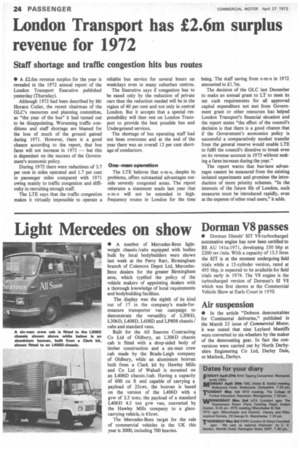London Transport has £2.6m surplus revenue for 1972
Page 26

If you've noticed an error in this article please click here to report it so we can fix it.
Staff shortage and traffic congestion hits bus routes
• A £2.6m revenue surplus for the year is revealed in the 1972 annual report of the London Transport Executive published yesterday (Thursday).
Although 1972 had been described by Mr Horace Cutler, the recent chairman of the GLC's resources and planning committee, as "the year of the bus" it had turned out to be disappointing. Worsening traffic conditions and staff shortage are blamed for the loss of much of the ground gained during 1971. However, there is a good chance according to the report, that bus fares will not increase in 1973 — but this is dependent on the success of the Government's economic policy.
During 1972 there were reductions of 3.7 per cent in miles operated and 1.7 per cent in passenger miles compared with 1971 owing mainly to traffic congestion and difficulty in recruiting enough staff.
The LTE says that the traffic congestion makes it virtually impossible to operate a reliable bus service for several hours on weekdays even in many suburban centres.
The Executive says if congestion has to be eased only by the reduction of private cars then the reduction needed will be in the region of 40 per cent and not only in central London. But it accepts that a special responsibility will then rest on London Transport to provide the best possible bus and Underground services.
The shortage of bus operating staff had not been overcome and at the end of the year there was an overall 12 per cent shortage of conductors.
One-man operation
The LTE believes that o-m-o, despite its problems, offers substantial advantages outside severely congested areas. The report reiterates a statement made last year that o-m o will not be extended to highfrequency routes in London for the time being. The staff saving from o-m-o in 1972 amounted to £1.7m.
The decision of the GLC last December to make an annual grant to LT to meet its net cash requirements for all approved capital expenditure not met from Government grant or other resources has helped London Transport's financial situation and the report states "the effect of the council's decision is that there is a good chance that if the Government's economics policy is successful a comparatively modest transfer from the general reserve would enable LTE to fulfil the council's directive to break even on its revenue account in 1973 without seeking a fares increase during the year."
The report warns that bus-lane advantages cannot be measured from the existing isolated experiments and promises the introduction of more priority schemes. "In the interests of the future life of London, such measures must be introduced rapidly, even at the expense of other road users," it adds.












































































































